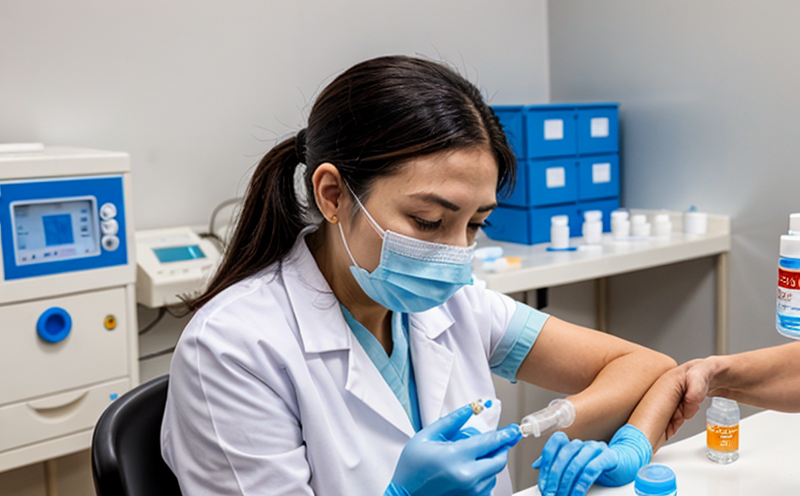USP Residual Protein Content Testing in Vaccines
The United States Pharmacopeia (USP) provides a range of monographs and guidelines that are essential for the quality assurance, testing, and release of pharmaceutical products. One such critical test pertains to residual protein content in vaccines. This service is particularly important as it ensures that there is no excessive or unintended protein present which could pose risks during administration.
The USP specifies that the level of residual proteins should be minimal and should not exceed a certain threshold, depending on the specific vaccine being tested. The process involves several steps including sample preparation, extraction, purification, and quantification using analytical techniques such as enzyme-linked immunosorbent assay (ELISA), high-performance liquid chromatography (HPLC), or capillary electrophoresis.
Sample preparation is crucial in this testing procedure. It often involves the use of denaturants to disrupt non-covalent bonds, thus facilitating easier extraction and purification processes. The chosen method can vary based on the vaccine's composition but typically aims at minimizing the disruption of active components while ensuring efficient removal of residual proteins.
Once prepared samples are obtained, they undergo thorough analysis using advanced analytical instruments like liquid chromatography-tandem mass spectrometry (LC-MS/MS). These tools allow for precise identification and quantification of even minute amounts of protein residues. LC-MS/MS provides high sensitivity and specificity making it ideal for detecting low levels of residual proteins.
It is important to note that the accuracy and precision of these tests are paramount given their implications on public health safety. Laboratories performing such analyses must adhere strictly to USP guidelines, ensuring consistent results across different batches and manufacturing processes. Compliance with international standards like ISO 17025 further enhances reliability by mandating proficiency in quality management systems.
The significance of this testing cannot be overstated as it helps guarantee that vaccines are safe for use. Any excess protein could lead to adverse reactions or diminish efficacy, thereby compromising the overall effectiveness and safety profile of a vaccine product. Regularly performing USP residual protein content tests ensures compliance with regulatory requirements while maintaining high standards of quality control.
In summary, conducting USP residual protein content testing in vaccines is vital for ensuring both the safety and efficacy of these crucial medical products. By adhering to stringent protocols and utilizing state-of-the-art technologies, laboratories can provide accurate and reliable data that support informed decision-making throughout the vaccine development lifecycle.
Industry Applications
This testing service finds application across various stages of pharmaceutical production, particularly in the vaccine sector. It plays a pivotal role during quality assurance checks to ensure that vaccines meet stringent regulatory standards set forth by organizations such as the USP.
The process begins at the research and development phase where it helps identify potential sources of unwanted proteins early on. In manufacturing, residual protein content testing ensures consistency across batches produced under different conditions or using various raw materials. During formulation optimization, this test aids in fine-tuning formulations to minimize any unintended protein impurities.
Additionally, post-market surveillance benefits significantly from regular residual protein content monitoring as it allows manufacturers to track changes over time and address any emerging issues promptly. This proactive approach not only enhances product safety but also builds consumer trust by demonstrating a commitment to maintaining high standards of quality.
Quality and Reliability Assurance
The importance of quality assurance in pharmaceutical testing, especially for vaccines, cannot be overstated. Ensuring that residual protein content is kept within acceptable limits is crucial not only to meet regulatory requirements but also to protect public health.
A robust quality management system (QMS) should encompass comprehensive procedures covering sample collection, preparation, and analysis to minimize errors and variability in results. Standard operating procedures (SOPs) play an essential role here by providing clear instructions on how each step of the process should be carried out consistently across all laboratories performing these tests.
Regular calibration and validation of equipment used for residual protein content testing are vital components of maintaining reliability and accuracy. Traceability to international standards like ISO 17025 ensures that methodologies employed align with globally accepted practices, thereby enhancing confidence in the results produced.
Training and certification of personnel involved in performing these tests further contribute to achieving consistent outcomes. Continuous education helps keep staff updated on advancements in technology and best practices, enabling them to adapt quickly to new challenges or requirements as they arise.
International Acceptance and Recognition
The USP's guidelines for residual protein content testing are widely recognized internationally. Countries around the world adopt these standards due to their rigorous approach towards ensuring drug quality and safety. This global acceptance underscores the importance of adhering strictly to USP specifications when conducting such tests.
International organizations like the World Health Organization (WHO) also recommend compliance with USP monographs, including those related to residual protein content in vaccines. By doing so, countries can harmonize their regulatory frameworks, facilitating smoother trade and collaboration among nations.
The widespread adoption of these testing protocols not only promotes consistency but also fosters trust within the industry. It reassures stakeholders—from regulators to healthcare providers—that the tests conducted meet world-class standards. This uniformity simplifies compliance processes for manufacturers operating across borders, ultimately benefiting patients by ensuring consistent quality across different markets.





